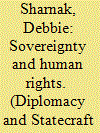| Srl | Item |
| 1 |
ID:
092404


|
|
|
|
|
| Publication |
2009.
|
| Summary/Abstract |
In today's global landscape, the success of interfaith initiatives is ascertained when their intended aim is envisioned and clarified. This article claims that the truest aim of interfaith dialogue in global perspective is the mutual transformation of cultural and religious realities, maintaining that when this vision becomes the underpinning informing the context of dialogue then interfaith engagement is elevated to an authentic spiritual practice effective across religious borders, assuring its destination in the advancement of intercultural relations and culture in general. Today, interfaith dialogue ought to focus more on common responses to global issues rather than differences among traditions; unimpeded, it can then engage mutual transformation for the benefit of all, achieving also significant steps toward transforming stultifying paradigms of present interreligious discourse. Positive change forwarding harmonious coexistence is an ongoing process involving the work of many generations. Steadfast youth involvement in interfaith dialogue is deemed imperative for sustainable harmony and peace.
|
|
|
|
|
|
|
|
|
|
|
|
|
|
|
|
| 2 |
ID:
132415


|
|
|
|
|
| Publication |
2014.
|
| Summary/Abstract |
This analysis examines the evolution of Jimmy Carter's human rights policy towards the Third World during the course of his Administration. By exploring the impact of the Soviet invasion of Afghanistan and the Soviet-backed Vietnamese invasion of Cambodia, it analyses how Carter responded to international outcry by pairing sovereignty as a human right, which specifically appealed to the concerns of newly independent nations in the late 1970s. Carter's shift is explained first by a brief outline of his initial human rights policy and stumbling blocks; second, by examining Third World responses to the dual invasions; and, finally, exploring how this affected Carter's human rights policy. It moves beyond claims that Carter abandoned his human rights agenda as he encountered an increasingly volatile international environment, instead examining the very real ways that he re-imagined this policy in the face of a changing global landscape.
|
|
|
|
|
|
|
|
|
|
|
|
|
|
|
|